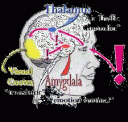What is Your Relationship With Your Emotions?
April 29, 2008 at 1:33 pm | Posted in health, self development/motivation | Leave a commentTags: byron katie, emotions, mona grayson, work
I’ve just received a newsletter from Mona Grayson, who is a facilitator of Byron Katie’s ‘The Work’. I found it really enlightening and like to share it with you.
What if your feeling emotions were as essential to life as drinking water?
What if expressing them were as ordinary as going to the bathroom or getting sleep?
Have you noticed that there are some human behaviors that you accept as necessary (and valuable) parts of life, and others that are seen as problems?
It seems to be okay with most people that they’ll need to eat a few times a day…
But when it comes to feeling depressed, even 5 minutes of that can seem too much.
Emotions are part of the experience of being human, and yet as a species we tend to want to avoid certain feelings.
Here are some of the recent questions I’ve received:
– “How can we prevent the escalation of negative emotions?”
– “How can I stop being so angry?”
– “Why can’t I get my anxiety under control?”
Let’s look at each question one at a time and explore some of the underlying beliefs and look at some different perspectives. Continue Reading What is Your Relationship With Your Emotions?…
Name That Feeling, You Will Feel Better
October 31, 2007 at 9:03 am | Posted in Uncategorized | Leave a commentTags: amygdala, emotions, feelings
Putting feelings into words makes sadness and anger less intense, U.S. brain researchers said in a finding that explains why talking to a therapist — or even a sympathetic bartender — often makes people feel better. Researchers scanned the brains of people who were shown pictures of faces expressing strong emotions and asked to categorize the feelings using words like “sad” or “angry”. They were also asked to match the face to one of two gender-specific names like “Sally” or “Harry”.
The findings showed that when people attached a word like “angry” to an angry-looking face, the response in the amygdala portion of the brain that handles fear, panic and other strong emotions decreased. This seems to dampen down the response in these basic emotional circuits in the brain — in this case the amygdala. What lights up instead is the right ventrolateral prefrontal cortex, the part of the brain that controls impulses.
So rather than talking about feelings leading to new insights, and that understanding being what transforms you, it may be that simply naming an emotion allows you to move on from it.
Source: Psychological Science
Blog at WordPress.com.
Entries and comments feeds.
